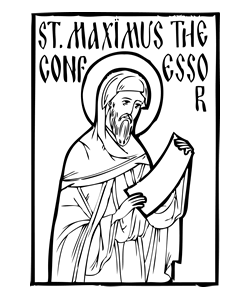|
|||
|---|---|---|---|
| This weekly bulletin insert complements the curriculum published by the Department of Christian Education of the Orthodox Church in America. This and many other Christian Education resources are available at http://dce.oca.org. | |||

Saint Maximus the Confessor was born in the year 580 in Constantinople. He defended the faith so uncompromisingly that he is one of the great Fathers of the Church. Maximus did not start out to be a monk or priest. His parents were members of the nobility, and he was highly intelligent and well-educated. When offered an important position in the court of the Emperor Heraclius, the young man accepted it and filled it very well. But Maximus soon realized that the worldly imperial court was not the place for him. He gave up his position and joined a monastic community outside the city. This was the right choice; he loved the monastic life and later became abbot of the monastery. His prayer life guided him to read, study and write about Jesus Christ with great depth of understanding. Life, though, was not destined to be peaceful. In the year 626 his monastery was invaded and dismantled. The monks were forced to leave, and Maximus fled from Alexandria to Carthage, and from Carthage to Rome. It was in Rome that he met Pope Martin I, with whom he discovered a very important common interest. Both of these scholarly, pious men opposed a false teaching about Jesus Christ called monothelitism. Those who adhered to this teaching said that He had only one will: His divine will. For Maximus and Martin, this was a dangerous falsehood because it undermined Jesus' complete and real humanity. To be the Savior of humanity, Maximus said, Jesus had to have two wills: His divine will as Son of God, and His human will as truly one of us. Unfortunately, the Patriarch accepted the Monothelite teaching. Even worse, the Emperor himself accepted it, largely for political reasons. So Maximus was accused of treason, taken back to Constantinople against his will, and thrown into prison where he languished for years. But he staunchly defended the faith, and the true humanity of the incarnate God, throughout all those years.
When he was in his early eighties, Maximus was finally sentenced. His tongue was cut out so that he could no longer speak "treasonous" words, and his hand was cut off so he could no longer write them. He endured all this, as well as exile, public humiliation and beatings, still insisting that Jesus Christ possessed and exercised both a human will and a divine will. At the Sixth Ecumenical Council which took place about two decades after his death, the Church exonerated him and declared his teachings to be true. Saint Maximus once wrote, "To harbor no envy, no anger, no resentment against an offender is still not the same as having love for that person. It is possible, without any love, to avoid rendering evil for evil. But to render good for evil—that is the quality of perfect spiritual love." These words have special power because they come from the heart of a man who suffered so cruelly for no crime except defending the truth. |
|||
